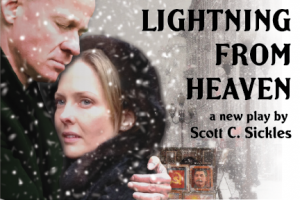 “Am I a gangster or murderer? Of what crime do I stand condemned? I made the whole world weep, at the beauty of my land.”
“Am I a gangster or murderer? Of what crime do I stand condemned? I made the whole world weep, at the beauty of my land.”
Never underestimate the power of words. They can be just as threatening or dangerous as a loaded gun, and the reaction to them could be equally as deadly. The book, “Doctor Zhivago” was that loaded gun. The New York Theatre Company’s “Lightning From Heaven,” a new play by Scott C. Sickles, isn’t as dangerous, as it’s length makes the production tiresome, but it is still poignant at times. Prepare yourself for a seemingly endless history lesson about the tale of an extraordinary couple, Boris Pasternack and Olga Ivanskaya, in an unimaginable world.
Set in various cells in the Lubyanka, the play chronicles Ivanskaya’s interrogation and trial with the KGB, and reveals her personal relationship with Pasternack as his mistress, through a series of flashbacks. An intriguing story biographically, the play loses its ability to truly captivate audiences. Even with a few lively characters, “Lightning,” which is two and a half hours long, is still too lengthy for this terribly bleak and tragic story. Those who are not familiar with the film or book, may have trouble following the story or finding an interest in it.
Jed Dickson and Kari Swenson Riely, who play Pasternack and Ivanskaya, deliver solid performances, but seem to be lacking the chemistry one would expect of lovers. Michael Selkirk portrays the Italian publisher, Feltrinelli, and is very humorous in the role. Though his character does seem a bit too silly or exaggerated at times, he is very likable and does get many laughs from the audience. Irina, played by Mary Ruth Baggot, gives a fine performance. Obviously not a child, she pulls off the role rather convincingly.
At a time when the Soviet Union was the suppressor of words that were contrary to their belief system, Pasternack and Ivanskaya refused to be silenced and stood up for artistic integrity and expression. Though many adored the movie, most people know little of the true story behind it. Pasternack and Ivinskaya were Yury and Lara, the two lovers in the beautifully, tragic, and haunting love story set in a brutal and oppressive Soviet Union. The book’s individualism conflicted with the forced conformity of the government who felt “Zhivago” was slanderous and symbolized disloyalty to the country. For Pasternack, the novel is full of love for his country, but speaks honestly about the oppression in which they lived under at that time. In a world where art existed only to serve the revolution, artists like Pasternack, did their best to make art serve life as they saw it.
The tragedies that Ivanskaya’s character endured in the movie, do not even compare to those in her real life. While Pasternack was somewhat protected by his wife’s family, Ivanskaya, was not. The KGB used her to get to him, thinking he would give up any writing critical of the Soviet system. Ivanskaya was imprisoned twice for her ties to Pasternack and spent years in prison labor camps. In flashbacks, we do get a brighter view of her life as we watch how she and Boris first met at Novy Mir magazine, where she worked as a literary editor. She collaborated with him on translating poetry from foreign languages into Russian, and was romantically involved with him, up until his death.
In the end, Boris and Olga left behind an enduring work of art, that speaks of their love for each other, their country, and their struggle for freedom, no matter what the cost. There is no greater death for a writer than to be silenced. Sickles should get credit for introducing audiences to the importance of Pasternack’s work, and to the woman who made it all possible. One might suggest googleing the pair, which may arouse more interest than the play or movie ever could. Overall, this may just be a play for those huge “Doctor Zhivago” fans who are out there, somewhere.

Leave a Reply